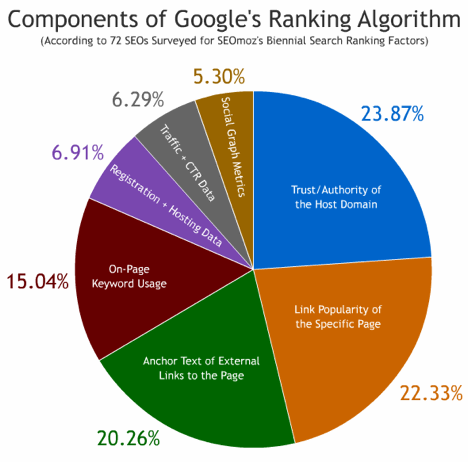With all the updates we get from Google with its algorithm, have you ever asked yourself if SEO Copywriting still matter? Some people will say yes, some people will say no. I’d like to share a great article from Copyblogger which helped me realize that SEO Copywriting does matter. This article was written by Brian Clark. Read on.
If there’s any one thing that can be said about SEO with certainty, it’s that it manages to cause a lot of confusion.
For example, it seems like many people’s idea of SEO was formed 10 years ago, and hasn’t bothered to change with the times. Even an online veteran like Robert Scoble is completely clueless about modern best practices for search engine optimization.
So, before we go any further, let me answer the question posed by the headline . . .
Yes, SEO copywriting still matters.
Here’s why.
Search is still the biggest game in town
“Pick your survey, search remains one of the top activities on the Internet and has been for over a decade,” said search industry legend Danny Sullivan when I pinged him on Twitter. Danny pointed me to one such survey that shows search is the most common online activity after email, and that fact cuts across generations.
“People make billions of unique searches each month,” said SEO guru Aaron Wall via email, “and unlike Facebook flittering, those people are in focus mode.” In other words, compared with most Internet traffic, searchers are the most motivated people that hit your site.
If they’re looking for a product or service, there’s a good chance they’re looking to buy it. If they’re searching for information and your site provides it, you’ve got a great chance of converting that drive-by traffic into a long-term subscriber.
And of course if you’re a professional web writer, whether freelance or with an agency, this discussion is purely academic. You try telling the client not to care about Google traffic, and let me know how that goes.
So, search traffic is clearly important, as long as it’s targeted search traffic. Let’s look at the elements that constitute the modern practice of search engine optimization so we can attract those highly-focused visitors.
Off-page elements eat the biggest slice of SEO pie
Take a look at the image below, generously loaned to me by SEOmoz:
A quick review of the chart reveals that as far as SEO goes, what happens off your site matters more than what’s on it.
- 23.87% – The general trust and authority that your domain has is the largest indicator of SEO success. As Authority Rules makes clear, what works for search engines is what works with people as well.
- 22.33% – The number of links to a specific page matters a lot too… so think twice about link viability when your content is just out of the gate.
- 20.26% – The anchor text of external links matters because this is Google’s way of finding out what your page is about according to other people, not just you.
In other words, it’s like my favorite saying goes:
What people say about you is more important than what you say about yourself.
In this case, Google wants to know that people are linking to you, and the words they’re using (link anchor text), because that’s a more trusted relevance indicator. So yes . . . compelling content is always rule number one. But just like great content goes unnoticed without promotion, great content doesn’t rank well if you don’t make it clear what it’s supposed to rank for.
But how do we get people to notice our content so they can link to it? That’s where social media comes in. Blogging, social news sites, Twitter, Facebook – these are organic content distribution systems powered by your audience (and their friends).
It may come as a surprise that some of the brightest minds in social media are SEOs, and they’re completely on the up-and-up and non-shady. It’s just that they’re too busy getting things done to proclaim themselves social media experts or some other nonsense.
The huge influence of “off-page” factors on search optimization is why I wrote the SEO Copywriting 2.0 series 3 years ago. I updated it for 2010, but it is still directly on point, because it deals with fundamental aspects of strategic content development that don’t really change.
If you haven’t, check out SEO Copywriting 2.0 to get more out of the remainder of this series. An understanding of content development strategies is critical before going the “last mile” with on-page optimization.
SEO copy is the “last mile” to strong search rankings
Are you familiar with the “last mile” problem in the broadband industry? You can have thousands of miles of high speed fiber optics carrying loads of data cross country, but if the final connection to the customer’s home is aging copper or pokey coaxial, the benefit of the optical cables is lost.
Likewise, if you do everything right by building an authority site that Google trusts, but don’t tell Google that your page content matches what people are actually searching for, the targeted traffic benefit is lost. That’s what effective SEO copywriting does – it tells Google which words are the most relevant ones.
You don’t have to optimize on-page upfront. But you do have to begin with the ending in mind from a keyword standpoint, due to the importance of anchor text when people link. We’ll go more into that in part two of this series.
And if you ignore this SEO stuff? Sure, you’ll get plenty of untargeted “long tail” traffic otherwise, but what good does that really do you? Even with an advertising business model, irrelevant traffic bounces off your site quickly, leading to disgruntled advertisers who don’t renew. And if you’re selling something, you’re only burning bandwidth.
The beauty of building a reader-focused online presence based on valuable content is that you can do well even if Google hates you. But the irony is, if you actually follow that path, Google loves you.
Take advantage of that. It’s the critical last mile of a well-rounded online marketing strategy that makes a huge difference to your overall success.
Traffic must convert, or why bother?
Now we come to the big point. Everyone loves traffic – it’s addictive and strangely gratifying in its own right.
But traffic doesn’t pay the bills. It’s people who take the actions you need them to who do.
Going back to that confusion, many think that a search-optimized web page is some ugly keyword stuffed mess that sends people running for the hills on sight.
That’s not true. At least not when done well.
Danny Sullivan said it well at the close of our discussion:
“Unfortunately, too many assume that SEO means trying to trick search engines. It doesn’t. It simply means building a site that’s friendly to them.”
ARTICLE SOURCE: This content is syndicated news that can be used for your research, and we hope that it can help your productivity. This content is for educational purposes and is not made for any kind of commercial purposes of this blog.






